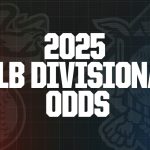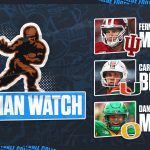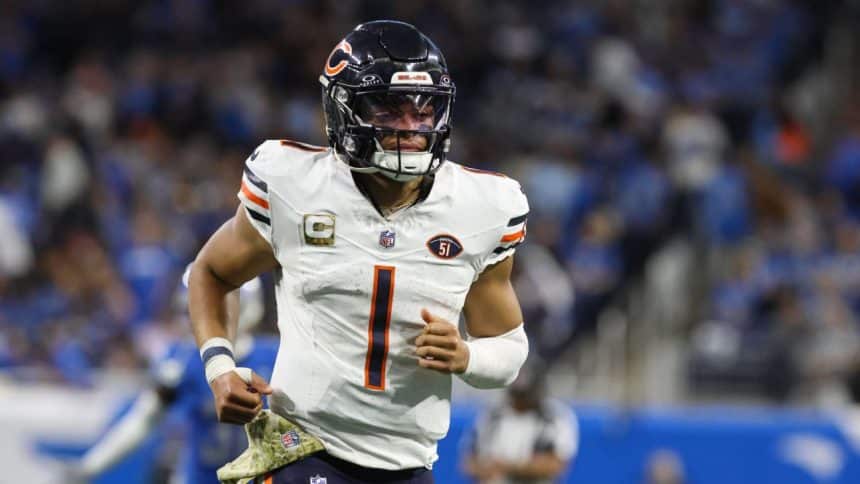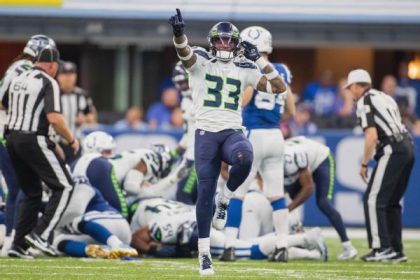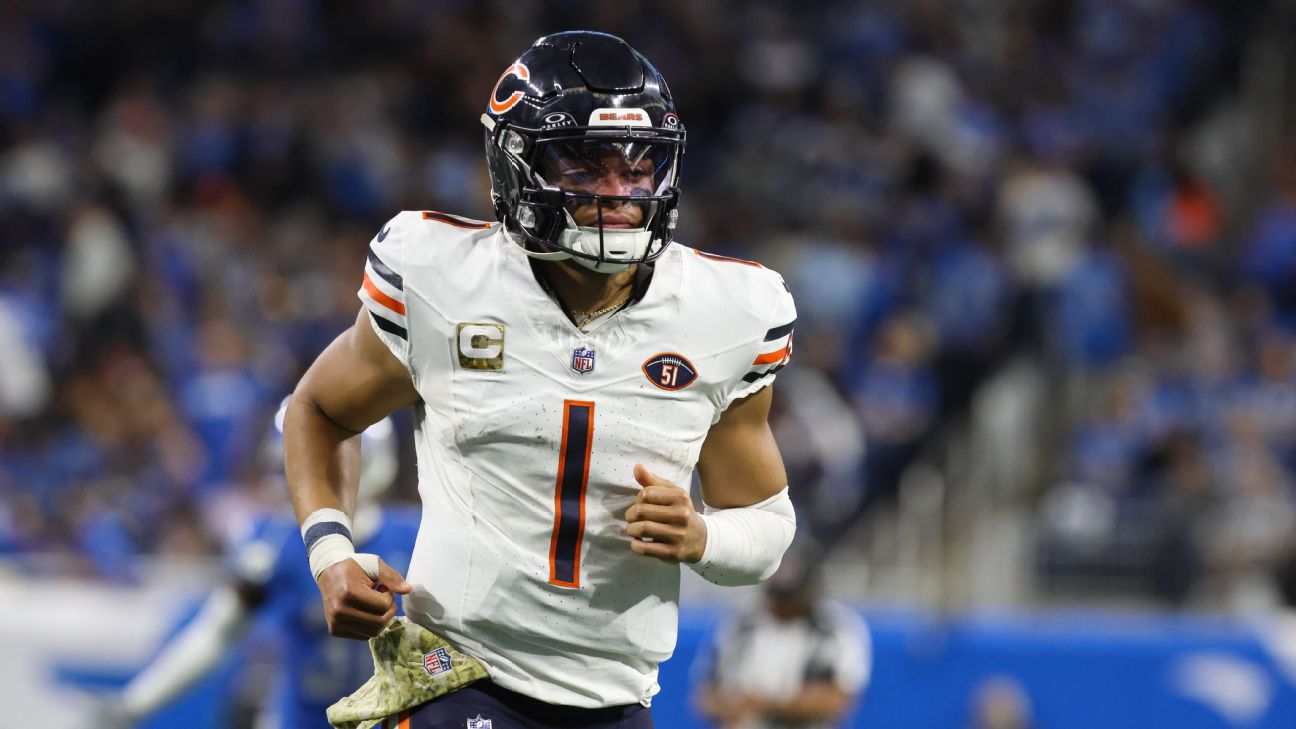
LAKE FOREST, Ill. — When Ryan Poles sorted through the options the Chicago Bears had with the No. 1 pick in the 2023 draft, the general manager came to a conclusion.
Poles said he would have to be “blown away” by Alabama’s Bryce Young and Ohio State’s C.J. Stroud, the top two quarterbacks taken in the draft, to move on from Bears quarterback Justin Fields ahead of his third season.
While Young has struggled on a 1-10 Panthers team, Stroud may one day be looked at as the one who got away. The Houston Texans rookie has 2,962 passing yards and is on pace to shatter Andrew Luck’s 2012 rookie passing record of 4,374 yards, and finish with 28 touchdown passes, which would be the second most by any rookie in NFL history after Justin Herbert’s 31 in 2020.
Stroud has entered the MVP conversation after his first nine games as a pro. Meanwhile, the Bears still aren’t certain whether Fields is their long-term answer at quarterback after 32 starts since 2021.
As the Bears close in the No. 1 pick for a second straight year (ESPN FPI gives Chicago a 69% chance to draft first overall because they own the Panthers pick), Poles’ logic from the pre-draft process now applies to his current QB. Fields needs to prove he is the Bears quarterback of the future, especially with two highly touted prospects in the 2024 draft — USC’s Caleb Williams and North Carolina’s Drake Maye.
In the past 20 years, eight NFL franchises, including the Bears’ previous regime, have selected a quarterback in the first round only to draft another within the next four years. That’s how Fields made his way to the Bears as the No. 11 pick in 2021, four years after Chicago passed on Patrick Mahomes and Deshaun Watson to draft Mitch Trubisky at No. 2.
In five months, the Bears may choose to go that route again if what they see from Fields, along with their evaluation of the draft’s top quarterbacks, lead the organization to start over. Here are three reasons the Bears could move on from Fields and why they could stick with him if they get the top pick.
Why the Bears could part ways with Fields if they get the No. 1 pick
Either Caleb Williams or Drake Maye is too good to pass up
The Bears don’t want to miss out on another Stroud. Poles and his scouting staff have watched Williams and Maye in person during the 2023 season, along with other top quarterbacks (such as Michigan’s J.J. McCarthy) and will weigh their evaluation against what they see as Fields’ ceiling.
ESPN contacted eight NFL scouts and executives who said Williams is the can’t-miss prospect.
“I thought from last year’s film, he would be top 10 the day he showed up,” an AFC executive said on the condition of anonymity.
A top 10 draft pick? Or top 10 quarterback when he gets to the NFL?
“The latter,” he clarified.
The USC quarterback won the Heisman in 2022 after throwing for 4,537 yards, 42 touchdowns and five interceptions. Williams’ numbers dipped in 2023 as the Trojans stumbled down the stretch to a 7-5 finish, but the quarterback threw for 3,633 yards, 40 touchdowns and five interceptions.
“A lot of the things they’re asking Fields to do, Caleb does better,” an NFC national scout said. “This guy thrives on his ability to improv, create on his own and turn a dead play into a highlight.”
However, some believe the gap isn’t as wide between Williams and Maye. The North Carolina quarterback threw for 3,354 yards, 22 touchdowns and seven interceptions in his third season.
“I’ve got Caleb No. 1, but I really don’t think Drake’s as far off as people think,” an AFC area scout said. “He’s been consistent all season long, even without his top receiver (Tez Walker was ineligible for UNC’s first four games). His size, arm strength, accuracy and mobility are going to translate well.”
Fields has had three years to prove he’s the franchise QB, yet the debate continues
As the clock wound down on the Bears in an eventual 31-26 loss to the Detroit Lions last Sunday, Fields had one final opportunity to get his team back in the game. Up to that point, Fields had put together a strong performance in his first game back since dislocating his right thumb on Oct. 15. He had over 250 yards passing and rushing and helped Chicago build a 12-point lead with over four minutes remaining. He had only been sacked once and had not turned the ball over.
On the first play of Chicago’s last drive, Fields was strip-sacked, and the ball went out of the back of the end zone for a safety.
Chicago’s fate was similar against Denver, when Fields played great for three quarters. As the Bears blew a 21-point lead, the team’s chances of a last-second comeback were halted when Fields threw an interception.
Chicago is looking closely at Fields’ performance in critical situations to determine growth. According to ESPN Stats & Information, Fields has a 4.1 Total QBR with two or fewer minutes remaining in either half with his team trailing this season, which is the worst of any starting quarterback. His completion percentage above expected in those moments is minus-19.4%, just above the Browns’ PJ Walker and Watson and the New York Giants’ Tommy DeVito.
Over the course of three years with his team trailing in the final two minutes, Fields has completed 57.4% of his passes, thrown two touchdowns and six interceptions and taken nine sacks. With the Bears trailing in the final four minutes, Fields completed 54.5% of his passes, threw three touchdowns, nine interceptions and took 13 sacks.
“That’s where we have to improve as a football team. Not just Justin,” coach Matt Eberflus said. “It’s us as a group. That’s where I think we take the next step to finishing games, and of course we’ve done that in some other games, but again we got to do that versus quality opponents.”
Resetting the clock on a rookie QB contract
The Bears have an estimated $82.4 million in salary cap space for 2024. That capital will be spent on premium positions to continue building the roster. Unless the Bears are certain Fields is their long-term answer, tying up resources in the 24-year-old might not be their best financial option.
Chicago has until May 2024 to exercise Fields’ fifth-year option, which is an estimated $23.3 million. Given the deadline is after the draft, if the Bears choose to draft a QB, their savings at the position will benefit roster building in the short and long term.
“Justin Fields is going to have to play out of his mind, because if it’s close, the economics are so compelling to take another quarterback to reset the clock,” ESPN front office insider Mike Tannenbaum said. “If you could reset the clock on a rookie quarterback alone, Justin Fields would have to be two to three times the player to not take a quarterback because you have to think about all those other players you can add with the savings.”
Why the Bears could keep Fields if they get the No. 1 pick
Fields is one of the best rushing QBs
Coming off injury, Fields had a career-high 14 designed runs against the Lions, leading to a team-high 104 rushing yards.
Fields, 24, has established himself as one of the league’s best rushing quarterbacks, though it was not a part of his identity much through his first six games of this season. The Bears have been adamant that while they’ve wanted Fields to develop as a passer, they did not want to take away the explosive gains he makes as a runner, like a 29-yard scramble in Detroit that got the Bears in position to score in the fourth quarter.
While Fields’ 18 rushing attempts against Detroit may not be the norm every week, the Bears believe having their quarterback operate a big portion of their offense with his legs is sustainable, so long as he protects himself from hits.
“It should be around in that range, but you don’t want it to be that high all the time,” Eberflus said. “He’s going to have to run when he scrambles around and does a good job. Where I do think he did a good job was, he made connections down the field and had his eyes down the field before he crossed the line.”
Some of Fields’ passing stats have improved each of his first three seasons
Despite having two head coaches and two offensive coordinators through his first three NFL seasons, Fields has shown growth as a passer everywhere except his QBR (45.1), which currently ranks 23rd. His completion percentage, touchdown percentage, yards per attempt and passer rating have steadily increased as he’s gotten more comfortable making plays from the pocket.
The growth sometimes appears marginal, given Fields has thrown for more than 300 yards once (335 vs. Denver, along with passing TDs), but if the Bears believe they can find the balance of production Fields displayed against Detroit (169 yards passing, 104 rushing) routinely, passing numbers will be made up for by the quarterback’s output in the run game.
Fields also hasn’t had the benefit of a true No. 1 receiver until this season with DJ Moore, and the Bears’ offensive line has struggled protecting its quarterback, although some of the blame rests on Fields taking too long to throw the ball.
Use two top-4 draft picks, or trade down to get more picks, to add talent
Since last offseason, Poles has invested money and draft capital in every premium position outside of quarterback.
He sent the No. 1 overall pick to Carolina in exchange for Moore and draft capital. He used a first-round pick on right tackle Darnell Wright, drafted a starting cornerback in Tyrique Stevenson and made Montez Sweat the fifth-highest paid edge rusher after trading a second-round pick to then quickly extend the defensive end.
The Bears are currently slated to draft No. 1, via Carolina’s pick, and fourth with their own first-round selection. If Fields replicates his performance against Detroit multiple times in his final six games, the Bears’ evaluation gets more challenging.
“That muddied the waters, for sure,” said Josh Lucas, who was the Bears’ director of player personnel from 2015 to ’21. “If he’s as good or better as he was [in Detroit] in four or five of their last six games … you start talking about, man, those two picks. If it’s the best pass-rusher in the draft and the best receiver in the draft, is Justin good enough to carry a really good team? In my opinion, yes.”
In that scenario, a Bears team with Ohio State wide receiver Marvin Harrison Jr., who is the first player in school history to record back-to-back 1,000 yard receiving seasons, could follow Poles’ blueprint of adding weapons. Chicago also needs to address its offensive line, potentially at left tackle and center, along with adding another pass-rusher. Many of those solutions could come via the draft if the Bears choose to hang onto Fields, forgo a quarterback and move back in the draft order.
“The reality is, if they keep Justin, you’re looking at two top-10 picks and a bunch of other stuff on top of that,” Lucas said. “They’ll end up having a really good roster even if they hit on 60% of those picks, because they’re not that far right now. They’re just really weak in certain spots.”




